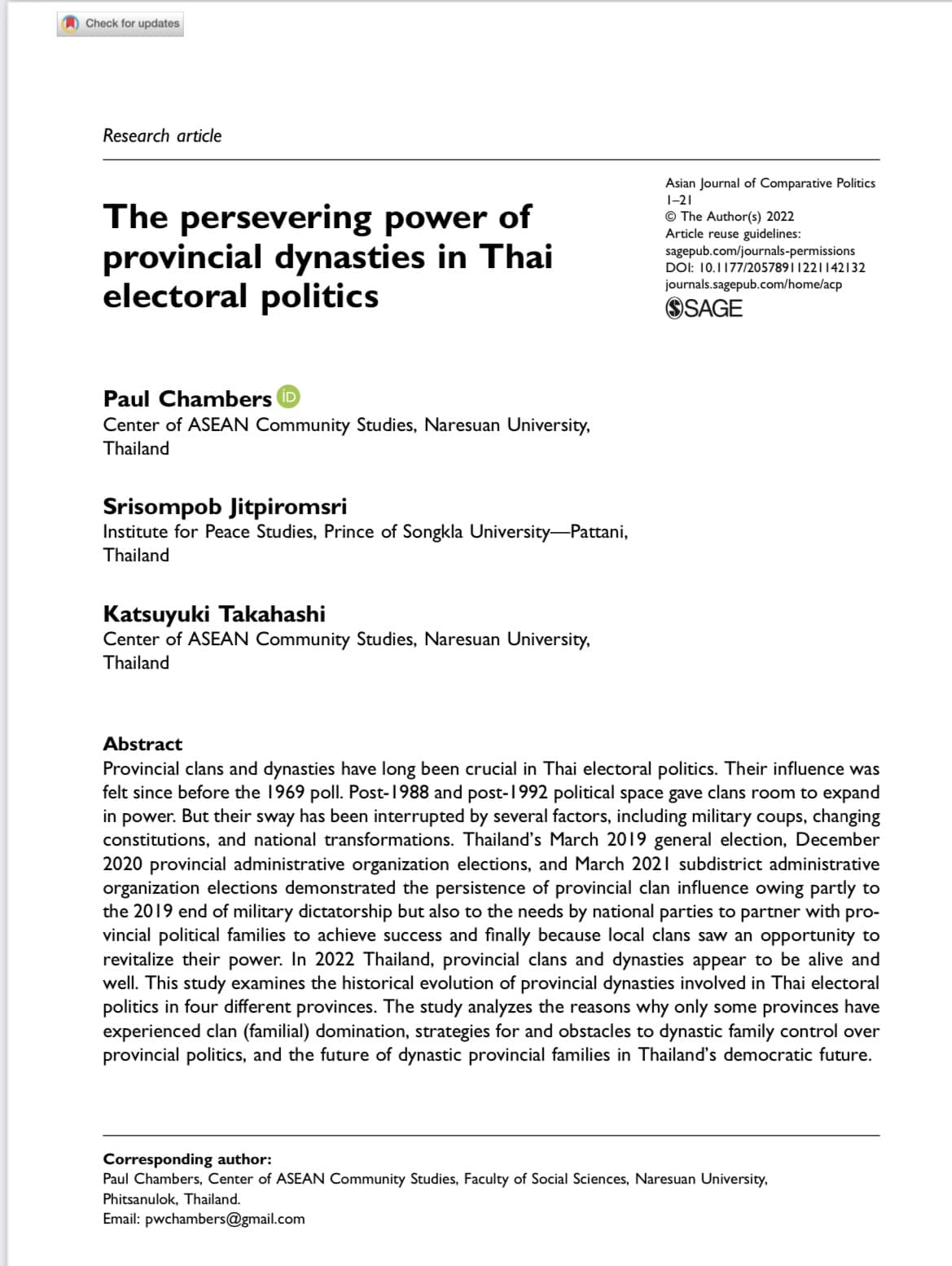
ความพยายามดิ้นรนในการยึดครองอำนาจอย่างเหนียวแน่นของตระกูลการเมืองในการเลือกตั้งของไทย
เครือข่ายสายตระกูลการเมืองใหญ่ๆในระดับจังหวัดมีบทบาทสำคัญมากในการเมืองแห่งการเลือกตั้งของประเทศไทยมานาน อิทธิพลแบบนี้เป็นที่รู้สึกกันมาตั้งแต่ก่อนการเลือกตั้งในปี พ.ศ. 2512 ภายหลังปี พ.ศ. 2531 และหลังปี พ.ศ. 2535 ซึ่งพื้นที่การเมืองได้เปิดให้ตระกูลการเมืองขยายอำนาจตัวเองออกไป แต่อำนาจพวกนี้ถูกสกัดกั้นให้หยุดชะงักด้วยปัจจัยหลายอย่าง รวมทั้งการรัฐประหาร การเปลี่ยนแปลงของรัฐธรรมนูญและการเปลี่ยนแปลงในระดับชาติ การเลือกตั้งทั่วไปในเดือนมีนาคมปี พ.ศ. 2562 การเลือกตั้งองค์การบริหารส่วนจังหวัดในเดือนธันวาคมปี พ.ศ. 2563 และเลือกตั้ง อบต. ในเดือนมีนาคมปี พ.ศ. 2564 แสดงให้เห็นว่าตระกูลการเมืองใหญ่ระดับจังหวัดยังคงรักษาอำนาจอย่างเหนียวแน่นเนื่องจากระบอบเผด็จการทหารเต็มรูปได้หยุดลงในปี 2562 แต่พรรคการเมืองในระดับชาติยังคงต้องการหุ้นส่วนจากตระกูลการเมืองระดับจังหวัดเพื่อชัยชนะและตระกูลท้องถิ่นมองเห็นโอกาสที่จะฟื้นคืนอำนาจของตัวเอง ประเทศไทยในปี พ.ศ. 2565 ครอบครัวการเมืองและตระกูลที่มีอำนาจดูเหมือนจะยังมีชีวิตรอดและอยู่อย่างดีด้วย การศึกษาครั้งนี้สำรวจวิวัฒนาการทางประวัติศาสตร์ของตระกูลการเมืองที่มีอำนาจที่เข้ามาเกี่ยวข้องกับการเลือกตั้งในสี่จังหวัดที่ต่างกัน การศึกษาได้วิเคราะห์เหตุผลที่ว่าทำไมมีเพียงบางจังหวัดเท่านั้นที่มีประสบการณ์ตระกูลการเมืองครอบงำ อะไรคือกลยุทธ์ที่สนับสนุนและขัดขวางตระกูลการเมืองไม่ให้มีอำนาจครอบงำการเมืองจังหวัดและอนาคตของตระกูลการเมืองไทย
The persevering power of provincial dynasties in Thai electoral politics
Provincial clans and dynasties have long been crucial in Thai electoral politics. Their influence was felt since before the 1969 poll. Post-1988 and post-1992 political space gave clans room to expand in power. But their sway has been interrupted by several factors, including military coups, changing constitutions, and national transformations. Thailand’s March 2019 general election, December 2020 provincial administrative organization elections, and March 2021 subdistrict administrative organization elections demonstrated the persistence of provincial clan influence owing partly to the 2019 end of military dictatorship but also to the needs by national parties to partner with pro- vincial political families to achieve success and finally because local clans saw
an opportunity to revitalize their power. In 2022 Thailand, provincial clans and dynasties appear to be alive and well. This study examines the historical evolution of provincial dynasties involved in Thai electoral politics in four different provinces. The study analyzes the reasons why only some provinces have experienced clan (familial) domination, strategies for and obstacles to dynastic family control over provincial politics, and the future of dynastic provincial families in Thailand’s democratic future.
อ่านดูรายละเอียดจากบทความวิจัยใหม่ตีพิมพ์ใน Asian Journal of Comparative Politics (2022) 1–21 คลิ๊ก ที่นี่